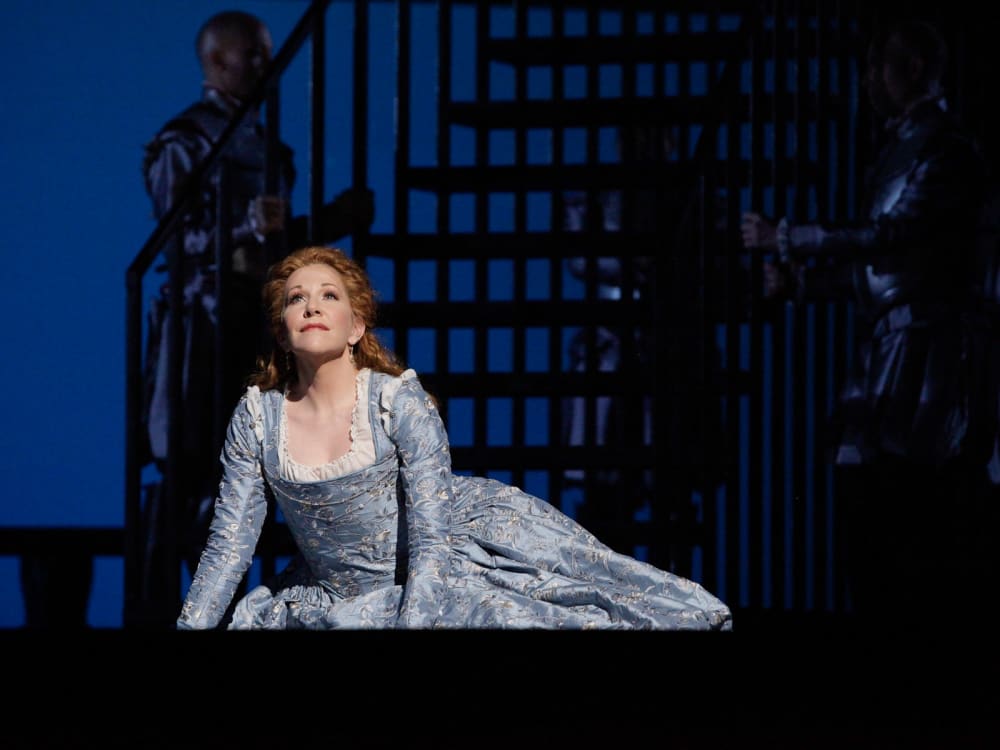The Review Is In
Women at war: With a chilling Mary Stuart, HGO pulls off a show-stopping seasonender
 A scene from the Houston Grand Opera's Mary Stuart with Katie Von Kooten asQueen Elizabeth and Robert Gleadow as TalbotPhoto by Felix Sanchez
A scene from the Houston Grand Opera's Mary Stuart with Katie Von Kooten asQueen Elizabeth and Robert Gleadow as TalbotPhoto by Felix Sanchez Joyce DiDonato is quite miraculous as Mary Stuart.Photo by Felix Sanchez
Joyce DiDonato is quite miraculous as Mary Stuart.Photo by Felix Sanchez
Last week on Bravo’s Real Housewives of Atlanta, Marlo Hampton calmly told Kim Zolciak, “You are a whore.” It was her matter-of-fact tone, perhaps, that made the insult so chilling.
Saturday night at Houston Grand Opera, however, there was more convincing episode of woman-to-woman shade and furor. Mary Stuart called her cousin and political rival Queen Elizabeth I an “unworthy whore” and a “foul usurper,” and it was the emphatic vocalism and genuine, impassioned disgust that made the slur as shocking as it must have been in 1835, when Donizetti’s opera premiered at La Scala.
Ah, if only today’s television aspiring divas would pay more attention to their operatic forebears!
Houston Grand Opera has really pulled out the stops for its final production of the current season, and done so with utmost sophistication.
Delivering an earth-shattering insult is so much more than just putting on a pricey pair of Louboutins and talking the talk. The second act of Mary Stuart is filled with an intricate web of confrontation, rich language and staggering emotions, even if the meeting between these two women existed only in the imagination of Friedrich Schiller, the German poet whose story is the basis for Giuseppe Bardari’s (and, at times, Donizetti’s own) fascinating libretto.
Mary reluctantly begs forgiveness. A wary Elizabeth replies, “It is fitting where you are, in the dust and in the shame!” And then they’re off: Elizabeth makes a little list of Mary’s transgressions and betrayals, and by the end of the duet, Mary has not only accused Elizabeth of being “the unchaste daughter of Anne Boleyn” (ouch), but even “a vile bastard.”
If I’m using the character names rather than those of the singers, it’s because the episode, for me the high point of Saturday night’s opera, was so convincing it was hard to believe it was “just” a performance. Houston Grand Opera has really pulled out the stops for its final production of the current season, and done so with utmost sophistication. A histrionic work like Maria Stuarda requires a certain artistic discretion, and this version (with scenery, props, and costumes from The Minnesota Opera) is classy and entirely convincing.
Musically, it’s not a masterpiece the caliber of Donizetti’s Lucia di Lammermoor, seen at HGO last year. But if one listens more closely, the opera is filled with extraordinary ensemble writing, lavish duets, rich choral passages and more than a few glorious arias for the title character.
Which brings me to Joyce DiDonato, well-loved here in Houston and quite miraculous as Mary Stuart, deposed Queen of Scotland. One can’t open a copy of Opera News these days without reading something about DiDonato, and I’ve heard that the bel canto repertory (often centered on Rossini, Bellini, and Donizetti) is really her thing.
It’s true. She is stunning in the part, making something very great out of each and every phrase.
This is, after all, a tragic opera, and DiDonato demonstrated why with brilliant conviction.
DiDonato is a mezzo-soprano, and the first thing to glow over in this Maria Stuarda is her brilliant range. She really gives attention to the lower notes, which are golden and resonant, almost jewel-like. The phrasing is smooth and well-connected. At the same time, she doesn’t belabor the arias, providing instead a kind of lightness more characteristic of Donizetti.
She doesn’t turn the part into “grand” opera, even if she brings grandeur to the role.
Vocally as well, the part requires a great deal of ornamentation, and DiDonato is remarkably agile throughout the entire opera. A lazier mezzo would likely slur her way through certain passages, but this never happened. I found myself admiring the singing just as pure musical, even aside from the emotional content.
Perhaps the thing that stunned me the most was her quiet intensity in certain arias sung pianissimo, yet ringing clear as a bell in the large theater. I never struggled to hear her, and the orchestra never dominated even her most subtle phrases. In the final scene depicting her ascent to the scaffold, it’s hard not to be moved deeply when she sings, “May my innocent blood, when shed, placate the anger of enraged heaven.”
This is, after all, a tragic opera, and DiDonato demonstrated why with brilliant conviction.
A Worthy Opponent
A great Mary requires an equally great Queen Elizabeth, and young American soprano Katie Van Kooten is nothing short of a sensation. It’s hard to imagine that Donizetti did not take a certain guilty pleasure in writing for this odd pairing of characters, namely, two competing queens on the same stage.
From her striking entrance raised high on a podium in the first scene, it was clear that Van Kooten was confident, in great voice, and ready to reign. Hers is a large, powerful voice, perhaps more suited to grand opera than bel canto, but it seemed right for this part.
Something in her intonation revealed perfection, and her pitch never wavered from being right on the mark. She “got” the problematic character, as well. Early on, she exclaims “Be silent!” to the courtiers, and it’s a thundering fortissimo, which makes for an appealing paradox.
You think to yourself, “I wouldn’t mess with her,” and this is a good indication that she has an exciting singing career ahead of her.
As I write this review, I’m listening to a recording of Maria Stuarda with Joan Sutherland in the title role and the celebrated Richard Bonynge conducting. To some ears, it would be considered “definitive” though I’m not sure if it was made according to the Wiklund “critical edition” of the score used by Houston Grand Opera for these performances.
Sutherland sounds good enough, but does she have the compelling subtlety of DiDonato? I think not. However, Luciano Pavarotti as Roberto, Earl of Leicester, makes me aware of something missing from the HGO performance: A great tenor.
American tenor Eric Cutler seems a capable enough artist for the role, though his singing throughout had a strange nasal quality, as if he might have been suffering from the allergy problems so common during the Texas spring weather. It could have been forgiven if his acting had been a little more engaged, but it wasn’t. Let’s hope he was just having an off night.
Robert Gleadow, however, is a fine actor and his resonant baritone was perfect for the challenging role of Talbot. Fans will remember his appealing interpretation of Truffaldino in last year’s Ariadne auf Naxos. More excellence came Saturday night, as well, with mezzo-soprano Catherine Martin, who gives a stalwart and praiseworthy performance as Anne.
Houston Grand Opera will perform Mary Stuart on Friday at 7:30 p.m., Sunday at 2 p.m., May 2 at 7:30 p.m. and May 4 at 7:30 p.m.
